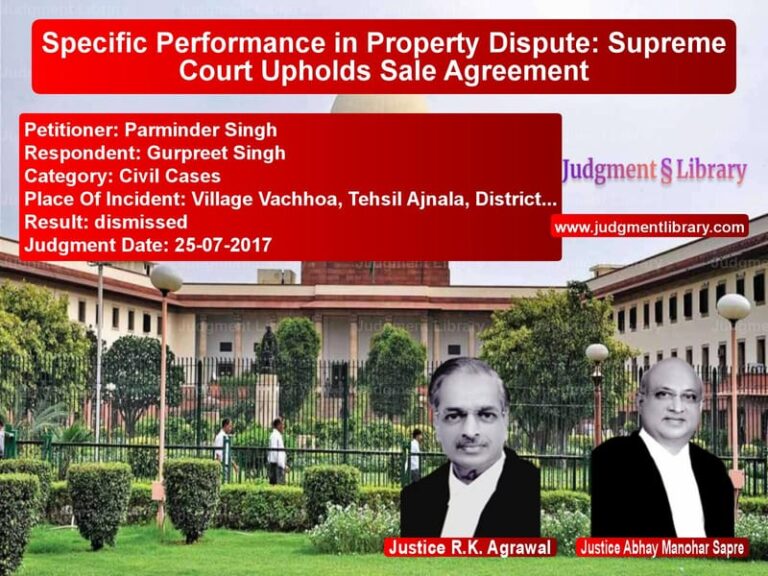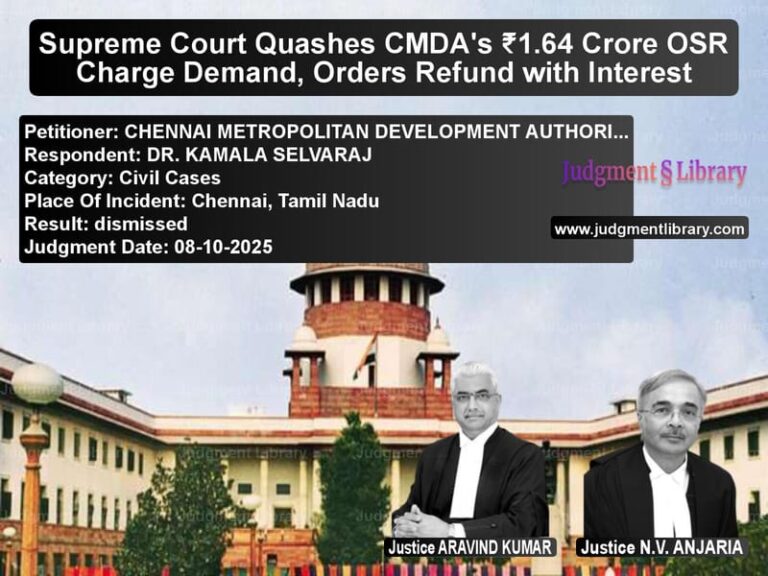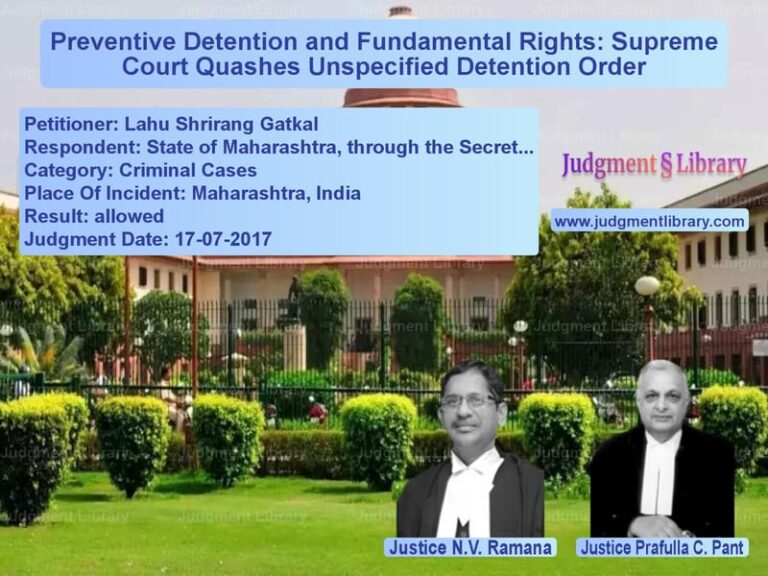Custody Dispute and Child’s Welfare: Supreme Court’s Ruling on Parental Rights and Visitation
The Supreme Court of India in this case dealt with a complex issue of child custody following the marital dispute between Ram Kishor Arora and Revathi. The case involves the custody of their child, Manish, who was born in 2011. The parents had divorced in 2014, and the custody of the child had been a matter of contention ever since. The appellant, Ram Kishor Arora, was granted custody of the child initially, but the respondent, Revathi, sought custody following the dissolution of the marriage. The case culminated in an appeal to the Supreme Court to resolve the long-standing custody dispute.
The main legal question raised was whether the decision of the lower courts, which had directed the appellant to hand over custody to the respondent, was valid considering the child’s welfare and preferences. The issue was complicated by the child’s reluctance to stay with his mother, which was central to the Court’s deliberations. Additionally, the case highlighted the importance of considering the child’s welfare as the paramount concern in custody disputes.
Petitioner’s Arguments
The appellant, Ram Kishor Arora, put forth the following arguments:
- The order for the child’s custody was given without considering the child’s welfare adequately. The child has been living with him since birth, and he has provided a stable environment for his growth.
- The child, who was 12 years and 9 months old at the time of the hearing, had consistently refused to go with his mother, despite efforts made by a mediator.
- The mother had not shown any meaningful efforts to develop a relationship with the child, and this had affected the child’s willingness to interact with her.
- The child’s refusal to go with the mother and his preference to stay with the father were essential factors to be considered in making the final decision.
Respondent’s Arguments
The respondent, Revathi, presented the following counterarguments:
- The respondent argued that as the mother of the child, she had a right to custody, and the courts had ordered this in previous rulings. The child had been with the father for a long period, but this did not preclude her from seeking custody.
- Revathi contended that the child’s reluctance to stay with her was due to the environment created by the father, and that, with appropriate effort and bonding, the child could live with her and flourish.
- She argued that the child’s welfare would be best served by having both parents involved in his upbringing, and a proper custody arrangement would ensure this.
Supreme Court’s Observations
The Supreme Court took into account the welfare of the child, which is paramount in custody disputes. The following observations were made:
- The Court emphasized that the welfare of the child should be the primary consideration when deciding on custody. It acknowledged that both parents have an inherent right to be involved in their child’s upbringing, but this right is secondary to ensuring the child’s well-being.
- It noted that the child had been living with the appellant since birth and was unwilling to go with the respondent. Despite this, the Court recognized the need for both parents to have an ongoing relationship with the child for his emotional development.
- The child’s preference was given considerable weight. However, it was recognized that the child’s refusal to go with his mother could stem from his long-term stay with the father and his reluctance to change his environment.
- The Court took into account the mediator’s report, which noted that while the child was initially averse to seeing his mother, he later agreed to meet her occasionally. The Court also noted that the child had shown some willingness to stay in touch with the mother.
- In keeping with the child’s welfare, the Court agreed with the mediator’s suggestion that the child should continue living with the father, but the mother should have visitation rights. The Court also suggested that the child’s visits be held in a neutral, comfortable place to encourage a gradual re-establishment of the bond between mother and child.
Final Judgment
The Supreme Court, after considering all aspects, made the following rulings:
- The custody of the child would remain with the father, as the child’s preference and welfare dictated that staying with the father was in his best interest at this stage.
- The mother, Revathi, was granted visitation rights, including phone calls and meetings at a public place on a mutually agreed schedule.
- The Court directed that further efforts be made for counseling, with the involvement of a counselor, to help improve the relationship between the mother and the child.
- The child was to have regular contact with the mother, but the child’s living arrangements would remain with the father for the time being. The Court noted that as the child grew older, his views and needs might evolve, and a reassessment of the custody arrangements could be considered later.
Conclusion
This judgment underscores the importance of considering the child’s welfare as the primary factor in custody disputes. While both parents have rights to the custody and care of their children, the child’s emotional well-being and preferences must take precedence. The Supreme Court’s decision strikes a balance by ensuring that the child’s immediate living situation remains stable while allowing for continued contact and relationship-building with the mother. The Court’s focus on mediation and counseling as part of the solution reflects the evolving understanding of family law in India, where the emotional needs of children are increasingly recognized as central to legal proceedings.
Petitioner Name: Ram Kishor Arora.Respondent Name: Revathi.Judgment By: Justice Rajesh Bindal, Justice Vikram Nath.Place Of Incident: Madurai, Tamil Nadu.Judgment Date: 05-12-2023.
Don’t miss out on the full details! Download the complete judgment in PDF format below and gain valuable insights instantly!
Download Judgment: ram-kishor-arora-vs-revathi-supreme-court-of-india-judgment-dated-05-12-2023.pdf
Directly Download Judgment: Directly download this Judgment
See all petitions in Child Custody
See all petitions in Alimony and Maintenance
See all petitions in Domestic Violence
See all petitions in Property Division in Divorce Cases
See all petitions in Divorce by Desertion
See all petitions in Judgment by Rajesh Bindal
See all petitions in Judgment by Vikram Nath
See all petitions in dismissed
See all petitions in supreme court of India judgments December 2023
See all petitions in 2023 judgments
See all posts in Divorce Cases Category
See all allowed petitions in Divorce Cases Category
See all Dismissed petitions in Divorce Cases Category
See all partially allowed petitions in Divorce Cases Category







